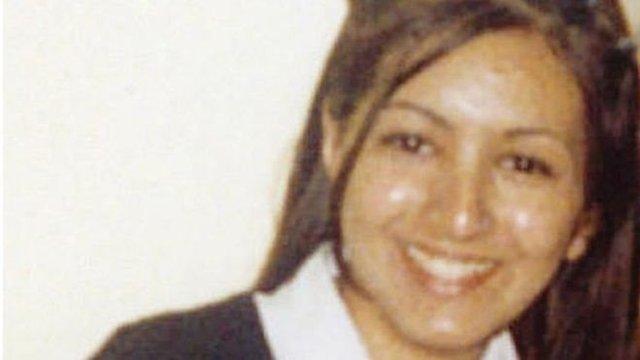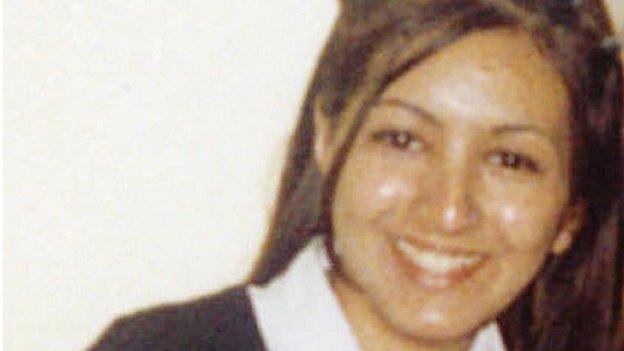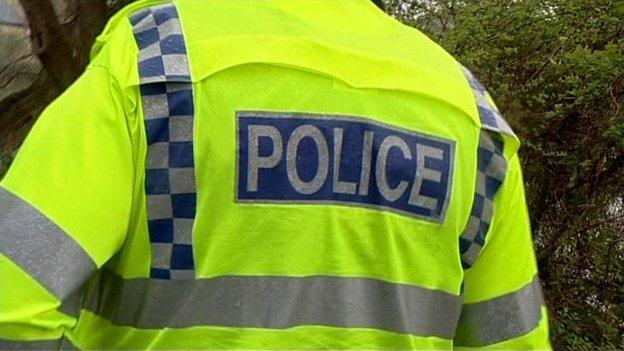Police 'not properly prepared' to tackle honour-based crime
- Published

Shafilea Ahmed was murdered by her parents in 2003 in a so-called "honour" killing
Police in England and Wales are not adequately prepared to combat so-called honour-based crimes, inspectors say.
In the first review of police responses, Her Majesty's Inspectorate of Constabulary said three forces out of 43 were completely unprepared and only three were fully prepared.
Well-trained officers capable of spotting victims were spread thinly across England and Wales, HMIC said.
Police chiefs said they were doing all they could to end honour-based abuse.
Honour crime is the name given to offences carried out by people claiming they are protecting their cultural and religious beliefs.
The HMIC review of police preparedness examined police tactics for identifying and stopping forced marriages and female genital mutilation (FGM).
'Pockets of good practice'
HMIC said that while there were "pockets of good practice" most forces needed to do a lot to improve.
Three - Staffordshire, Thames Valley and Dyfed Powys - were found not to have passed any key tests for preparedness.
The Metropolitan Police and Greater Manchester Police were among those that failed on tests of their ability to enforce the law.
Only three forces passed all stages of the review - West Midlands Police, Derbyshire and Northumbria.
The HMIC said that a joint operation at Heathrow Airport, external between the Met and border officials, designed to identify people being taken in or out of the UK for FGM or a forced marriage, had not uncovered any crimes or perpetrators.
Some forces had developed tactics for combating honour crimes from their existing strategies on domestic and child abuse, but the HMIC said forces did not have a "sound and complete understanding of the nature or magnitude of these crimes, nor how best to respond to them."

Honour crime victims

Commander Mak Chishty, the National Police Chiefs' Council lead on the issue, said it was "working to develop a more consistent approach to policing in this area, particularly in the early identification of victims, potential offenders and protecting vulnerable people by managing risk".
He added: "We agree with HMIC that the victims of honour-based violence are often most at risk from those closest to them: their families and relatives.
"They have the right to be listened to, believed, taken seriously and protected; we are committed to improving our response so that this happens consistently."
HM Inspector of Constabulary Wendy Williams said honour-based violence was being suffered "on a daily basis" by innocent people "across all areas and communities".
She added: "The immense emotional difficulty victims have in reporting the crimes they have suffered means that victims are acutely and continually vulnerable.
"It is clear that the police service has some way to go before the public can be confident that honour-based violence is properly understood by the police, and that potential and actual victims are adequately and effectively protected."
Crime 'in the shadows'
Jasvinder Sanghera, founder of charity Karma Nirvana, which supports victims of honour crimes and forced marriages, told BBC Radio 4's Today programme the way honour-based crimes were dealt with was "getting better" but more needed to be done.
"Does this [report] mean that chief constables and police and crime commissioners are going to demonstrate some leadership in making this part of the broader mainstream agenda of domestic violence?" she said.
"Because when victims are calling the helpline day in and day out, they are still not being believed. It is like a postcode lottery out there - responses are very much dependent on who you get on the day as to whether you are going to be protected or not, and that is not good enough."
HM Chief Inspector of Constabulary Sir Thomas Winsor said: "Cultural traditions and sensitivities deserve and should always be given due respect.
"But where they operate to imprison vulnerable people behind barriers of fear and the threat or reality of violence, and facilitate or intensify crimes committed against them, such barriers must be broken."
Keith Vaz, chairman of the Home Affairs Select Committee, said the report showed that honour crime "remains in the shadows".
He welcomed the report's recommendations on better training, engagement with communities and better services for victims.
- Published14 July 2015

- Published9 July 2015

- Published25 June 2015
